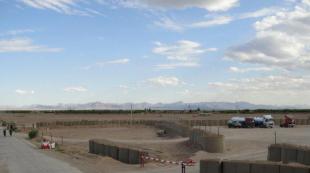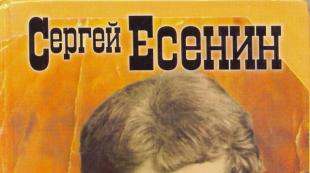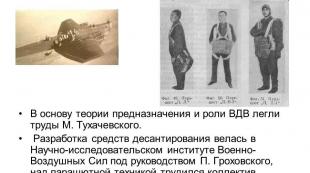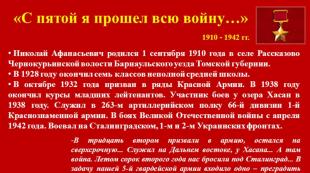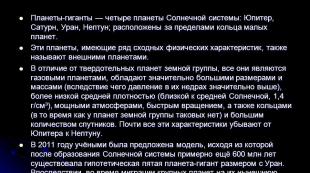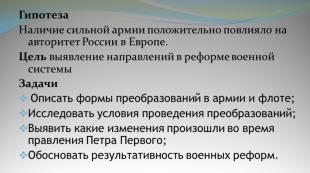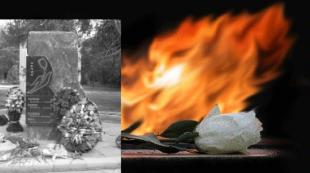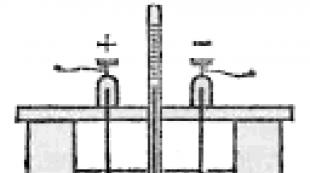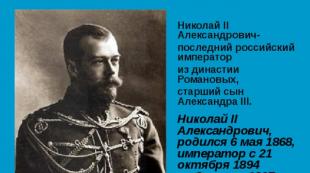"About the Motherland." Comparative analysis of the works of Alexander Blok and Sergei Yesenin. “About the Motherland” Comparison of the poetry of Blok and Yesenin
Reading the poems of Blok and Yesenin, we see that throughout almost their entire work they praised Rus'. Reading Yesenin, together with him we experience an ardent love for the Motherland, for life and everything living on earth, we feel a connection with the people, we realize the uniqueness and value of human feelings.
“The feeling of the Motherland is the main thing in my work,” said Yesenin. Homeland is, first of all, the place where we were born and raised. Nature in Yesenin’s poems is a part of everyday life, and therefore the sun is compared to a cart wheel, clouds to cows, watering the fields with their milk. And all these images are formed from village folklore. Yesenin's Rus' is a feeling of beauty, harmony and expanse. We see endless fields, huts, and all this gives us a feeling of awe. And we understand that there is nothing more valuable than the Motherland. Yesenin looks at the world at the same time bright and sad, because this native land is outwardly discreet and poor. But still he is close to the poet’s heart. And even though the beloved house is low, and the heavens look like cheap chintz, and the bread is not rich, the poet warms all this with his ardent love. We know that love for the Motherland is the basis of patriotism, morality and spirituality. For a peasant there is no beauty without labor. Labor reveals strength and prowess. In the poem “I walk through the valley...” joyful work is manifested in celebration. Love for the Motherland helped Yesenin accept the revolution with all his heart. Yesenin also combines the image of his mother with the image of the Motherland. Mother for Yesenin is the image of the embodiment of moral purity. For Yesenin, the revolution appeared as the fulfillment of the people’s age-old dream of a happy life: “Long live the revolution on earth and in heaven.” In the poem “Letter to a Mother,” speaking about the “golden log hut,” Yesenin affirms the need for a person to have a sense of the Motherland, a connection with his father’s house. In the poem “Uncomfortable Liquid Moonlight,” Yesenin rejects backward Rus' and replaces it with endless plains and withered willows. Glorifying the beauty of the new “steel Rus',” Yesenin remains faithful to the love of his father’s land.
Yesenin’s love for the beauty of rural Rus' is resolved by the motive of spiritual and physical merging with it; he would like to “get lost” in it. The poet experiences excess happiness as self-destruction: “I would like to get lost in your hundred-ringed lands.” In the poem “Where the secret slumbers forever,” the poet’s spirit leaves the earth, where he is only an “accidental guest,” in order to look down at the same native arable lands and copses. The revolution revived Yesenin’s poetry and broke the silence of the “blue fields and groves.” The poet does not yet know how the revolution will turn out for Rus'. He presents his homeland with images of his joyful forebodings and expectations. The center of everything that happens is Rus', in its peasant guise: “There is nothing better, nothing more beautiful than your cow eyes.”
The image of “Blizzard Rus'” even fills space: “Above the clouds, like a cow, the dawn lifted its tail.” Yesenin's poetry is colored mournfully, the poet is sad for the dying village, which he recognizes as an eternal source of spirituality.
Love and beauty for Blok are the highest manifestation of the human spirit; they are filled with purifying power.
The poet measures the reality of reality with beauty. The most dear theme for Blok was the theme of his native land and unchanging love for it. In all the poems we see the sincerity of the words about Rus'. The theme of the Motherland in the poem “Russia” goes as if into the future and echoes the perception of the Motherland by Pushkin and Nekrasov. True nationality brings Blok’s confession closer to Lermontov’s “strange” love for the fatherland. Even the situations in the poems of these poets are similar. Mournful love is expressed: “Your wind songs are like the first tears of love.”
The theme of the Motherland, Russia, organically entered into Russian poetry, absorbing all the best that was characteristic of Russian poets. Pushkin, Lermontov, Nekrasov, Yesenin, Blok... Each of them found in this topic their own, deeply personal, and at the same time something common that constitutes the essence of the Russian national character, without which the meaning of life on earth is lost. “I consciously and irrevocably devote my life to this topic. I realize more and more clearly that this is the primary question, the most vital, the most real,” wrote Alexander Blok at the end of 1908 to K.S. Stanislavsky. We find a recognition consonant with this in Sergei Yesenin: “My lyrics are alive with one great love - love for the homeland. The feeling of homeland is central to my work.”
Turning to Blok’s lyrics, one feature should be noted in the depiction of the Motherland. The main role in the poet’s perception of the Motherland is played not by his external impressions, but rather by their refraction in the poet’s soul, comparison with his internal experiences. He spoke about his homeland with endless love, with heartfelt tenderness, with aching pain and bright hope. His fate is the fate of his homeland, inseparable from it, inextricably linked with it:
Russia, poor Russia,
I want your gray huts,
Your songs are like wind to me, -
Like the first tears of love!..
A broad, multi-colored, full of life and movement picture of his native land “in tear-stained and ancient beauty” is composed in Blok’s poems. Vast Russian distances, endless roads, deep rivers, violent blizzards and snowstorms, bloody sunsets, burning villages, mad troikas, gray huts, alarming cries of swans and cries of a flock of cranes, milestones, trains and station platforms, the fire of war, soldier trains, songs and mass graves - all this, as if in a colorful kaleidoscope, flashes before us when we read Blok’s poems, and all this is Russia, his long-suffering homeland. Even if she is poor, even if she is bitter and joyless, the poet sees in her such power that her enemies and rapists cannot resist:
Which sorcerer do you want?
Give back the robber's beauty!
Let him lure and deceive, -
You won't be lost, you won't perish,
And only care will cloud
Your beautiful features...
With such thoughts and confessions the poet addressed Russia, and truly it was not pity for his homeland, but he experienced completely different feelings - love, adoration, pride, that pride for her, which at one time inspired Gogol to create the anthem Russia - the unstoppable troika rushing with unbridled force into boundless distance.
Over the years, the poet’s very idea of his homeland became more and more real and distinct. In the cycle “On the Kulikovo Field,” the poet’s voice seems to dissolve in the voice of the very history of his native country, which has such a great past and a huge future that it takes your breath away; it is in the past that the poet looks for the life-giving force that allows Rus' not to be afraid of “darkness.” This is how the image of the Motherland appears - a steppe mare rushing at a gallop. The steppe mare embodies both Scythian origins and eternal movement. Blok's search for the future is tragic. Suffering is the inevitable price to pay for moving forward. Therefore, the path of the Motherland lies through pain: “Our path - the arrow of the Tatar ancient will pierced our chest.” In this poem, Blok created an original and unique lyrical image of the homeland - not a mother, as it was among the poets of the past, but a beautiful friend, lover, bride, “bright wife” - an image covered in the poetry of Russian song and fairy tale folklore:
Oh, my Rus'! My wife! To the point of pain
We have a long way to go!
There is an “eternal battle” going on - for Rus', for a dear friend, for everything that is dear and sacred, and there is no rest in this difficult and intense struggle:
And eternal battle! Rest only in our dreams
Through blood and dust...
In the thunderstorms and storms of the revolution, the Motherland revealed itself to Blok as the closest and dearest thing in life. Blok's Russia is hope and consolation. Her face “brightens forever”, she preserves the “original purity” of the poet’s soul. This is a country of enormous, not yet fully revealed power and energy. She will never disappear or perish, with her “even the impossible is possible” - she leads to the “eternal battle” and shows the way forward, to the future. “The future of Russia lies in the barely touched forces of the masses and underground wealth...” wrote Blok two years before the October Revolution. “Russia is a storm,” said Blok. The poet expressed his new understanding of the homeland and the revolution in the poem “The Twelve.” In it he captured the image of a new, free homeland that was revealed to him in the romantic snowstorms and fires. The personification of the new universal and all-human religion, the symbol of the universal renewal of life, was the image of Christ at the end of the poem.
In the decisive days for the revolution, Blok again turned to the question that worried him about the historical destinies and tasks of Russia. His poem “Scythians” sounded at the same time as a formidable warning to the old world:
Millions of you. We are darkness, and darkness, and darkness.
Try it and fight us!
Yes, we are Scythians! Yes, we are Asians, -
With slanted and greedy eyes!
and as a passionate appeal to all people of good will to end the “horrors of war”:
Come to us! From the horrors of war
Come into peaceful embraces!
Before it's too late, sheathe the old sword!
Comrades! We will become brothers!
Blok believed in the great future of Russia. In 1918 he wrote: “Russia is destined to endure torment, humiliation, division; but she will come out of these humiliations new and in a new way great...” The poet knew - and could repeat after Bryusov - significant words that were first heard at the beginning of the century:
The poet is always with people when they make noise
storm,
And the song with the storm is forever sisters.
In these lines we find a true and deep answer to the question of what constitutes the main meaning of Blok’s poems, which have great vitality and have rightfully now become the property of the widest circles of our readers.
The singer of Russia, the poet in whom “Rus' shines in his heart,” was Sergei Yesenin. For a little over ten years, Yesenin’s voice rang in Russian poetry; During this time, his views on life and people changed, the turbulent era put forward new themes, the poet developed and grew. But his constant love remained his homeland. He remained faithful to this great theme all his life. And all of him is like one heartfelt and piercing song about Russia: he sang his most sincere songs to her, his love for her “tormented, tormented and burned him.” Everything: the fire of dawn, and the splash of a wave, and the silvery moon, and the rustle of reeds, and the immense blue of heaven, and the blue surface of lakes - all the beauty of the native land is reflected in poems full of love for the Russian land:
About Rus' - raspberry field
And the blue that fell into the river -
I love you to the point of joy and pain
Your lake melancholy
The theme of the Motherland develops throughout Yesenin’s entire creative career. The image of the Motherland appears already in the first verses. The poet sings of the discreet beauty and amazing beauty of the nature of central Russia. The joyful and colorful world literally fascinates when we read Yesenin’s poems. Rodina-Rus in pre-October poems appears as a free and at the same time long-suffering country, in Nekrasov’s “poor and abundant” way. Therefore, her image is most often accompanied by sad and melodious intonations. In the poem “Go you, my dear Rus'...” the young poet managed to express the feeling of love for his homeland so simply, clearly, strongly and artistically that this put him among the largest Russian poets:
If the holy army shouts:
“Throw away Rus', live in paradise!”
I will say: “There is no need for heaven,
Give me my homeland."
The October Revolution illuminated Yesenin's poetry with a new light. In his poems of this period, with “cosmic” pathos glorifying the future of “formidable” Rus', biblical images appear that reflect the poet’s desire to convey the grandeur of what happened. Yesenin expected from the revolution an idyllic “earthly paradise” for men. The poet’s hopes were not justified, and Yesenin is experiencing a period of spiritual crisis, cannot understand “where the fate of events is taking us.” The renewal of the village seems to him to be an invasion of a hostile “bad”, “iron” guest, against whom nature itself is defenseless. And Yesenin feels like “the last poet of the village.” But “while remaining the poet of the golden log hut,” Yesenin understands the need for change in the old village. A passionate desire to see “the power of one’s native country” sounds in the lines:
I don't know what will happen to me...
Maybe I'm not fit for a new life,
But I still want steel
See poor, beggarly Rus'.
Feeling his involvement in everything that is happening in the Soviet country, Yesenin writes:
I accept everything.
I take everything as is.
But a little time passes and the poet’s attitude towards the new changes. In the “split” of the country, he does not find the embodiment of his expectations. The revolution changes the usual way of life of the Russian village. Then the bitter lines of the poems are born: “Leaving Rus'”, “Soviet Rus'”, “Homeless Rus'”. The poet tries to escape from himself, goes abroad. But life away from his beloved Russia turns out to be impossible. He returns home, but Russia is no longer the same, everything has changed, everything has become foreign to him:
The language of my fellow citizens has become like a foreign language to me,
It's like I'm a foreigner in my own country.
If in Yesenin’s pre-revolutionary poems peasant Rus' looked like “an abandoned land,” “a wasteland,” now the poet sees Soviet Rus' as awakened, reborn to a new life. And Yesenin sincerely greets the younger generation: “Blossom, young ones! And have a healthy body! You have a different life, you have a different tune.”
The poet sincerely strove to keep up with his times, to be a faithful son of his homeland and his people. Shortly before his death he wrote:
I want to be a singer
And a citizen
So that everyone
Like pride and example,
Was real
And not a stepson -
In the great states of the USSR.
Selfless love for his people, boundless faith in him, patriotism in Yesenin’s poetry, expressed with captivating sincerity, made his poetry the property of numerous readers. His lyrics leave no one indifferent and continue to live, awakening a feeling of love for the native land, for everything near and dear.
Reading the poems of Blok and Yesenin, we see that throughout almost their entire work they praised Rus'. Reading Yesenin, together with him we experience an ardent love for the Motherland, for life and everything living on earth, we feel a connection with the people, we realize the uniqueness and value of human feelings.
“The feeling of the Motherland is the main thing in my work,” said Yesenin. Homeland is, first of all, the place where we were born and raised. Nature in Yesenin’s poems is a part of everyday life, and therefore the sun is compared to a cart wheel, clouds to cows, watering the fields with their milk. And all these images are formed from village folklore. Yesenin's Rus' is a feeling of beauty, harmony and expanse. We see endless fields, huts, and all this gives us a feeling of awe. And we understand that there is nothing more valuable than the Motherland. Yesenin looks at the world at the same time bright and dull, because that same native land is inconspicuous and poor in appearance. But still he is close to the poet’s heart. And even though the home is low, and the heavens look like cheap chintz, and the bread is poor, the poet warms all this with his ardent love. We know that love for the Motherland is the basis of patriotism, morality and spirituality. For a peasant there is no beauty without labor. Labor reveals strength and prowess. In the poem “I walk through the valley...” joyful work is manifested in celebration. Love for the Motherland helped Yesenin accept the revolution with all his heart. Yesenin also combines the image of his mother with the image of the Motherland. Mother for Yesenin is the image of the embodiment of moral purity. For Yesenin, the revolution appeared as the fulfillment of the people’s age-old dream of a happy life: “Long live the revolution on earth and in heaven.” In the poem “Letter to a Mother,” speaking about the “golden log hut,” Yesenin affirms the need for a person to have a sense of the Motherland, a connection with his father’s house. In the poem “Uncomfortable Liquid Moonlight,” Yesenin rejects backward Rus' and replaces it with endless plains and withered willows. Glorifying the beauty of the new “steel Rus',” Yesenin remains faithful to the love of his father’s land.
MBOU Lyceum No. 1 named after. G.S. Titova
Literary living room
“The Theme of the Motherland in the Works of A. Blok and S. Yesenin”

Compiled by: Olga Alekseevna Orlova,
teacher of Russian language and literature
MBOU Lyceum "1 named after. G.S. Titova
Krasnoznamensk
2015
Goals:
introduce students to the poetic works of A. Blok and S. Yesenin dedicated to Russia,
to trace the evolution of feelings for the Motherland in the lyrics of poets, to open new pages in the lives of writers for students,
enrich the idea of their personality;
reveal the image of the Motherland and the artistic means of its embodiment in the lyrics of A. Blok and S. Yesenin.
Tasks:
developing skills in expressive reading and text interpretation;
the ability to analyze a work of art, interpret what you read, carefully thinking about every word.
explore the works of A. Blok and S. Yesenin;
note the features of the depiction of native nature in poems;
find out what place the theme of the Motherland occupies in the lyrics of poets.
Decor:
Computer presentation, book exhibition table.
Leading: The theme of the Motherland, Russia, organically entered into Russian poetry, absorbing all the best that was characteristic of Russian poets. Pushkin, Lermontov, Nekrasov, Yesenin, Blok... Each of them found in this topic their own, deeply personal, and at the same time something common that constitutes the essence of the Russian national character, without which the meaning of life on earth is lost.
Reader: There are national shrines...
Leading: “I consciously and irrevocably devote my life to this topic. I realize more and more clearly that this is the primary question, the most vital, the most real,” wrote Alexander Blok at the end of 1908 to K.S. Stanislavsky.
Leading: We find a confession consonant with this in Sergei Yesenin: “My lyrics are alive with one great love - love for the homeland. The feeling of homeland is central to my work.”
Leading: In the works of Blok and Yesenin, despite the individual style and literary traditions of each, there is much in common. Both of them agree on the understanding of the Motherland, Russia, which for them has always been the most dear, beloved thing that a person can have; the most cherished dreams and aspirations of poets were dedicated to it.
Leading: Turning to Blok’s lyrics, one feature should be noted in the depiction of the Motherland. The main role in the poet’s perception of the Motherland is played not by his external impressions, but rather by their refraction in the poet’s soul, comparison with his internal experiences. He spoke about his homeland with endless love, with heartfelt tenderness, with aching pain and bright hope. His fate is the fate of his homeland, inseparable from it, inextricably linked with it:
Leading: A broad, multi-colored, full of life and movement picture of his native land “in tear-stained and ancient beauty” is composed in Blok’s poems. Vast Russian distances, endless roads, deep rivers, violent blizzards and blizzards, bloody sunsets, mad troikas, gray huts, alarming cries of swans and cries of a flock of cranes, the fire of war, soldier trains, songs and mass graves - all this flashes by as if in a colorful kaleidoscope before us when we read Blok’s poems, and all this is Russia, his long-suffering homeland. Even if she is poor, even if she is bitter and joyless, the poet sees in her such power that her enemies and rapists cannot resist:
Reader: Russia. ( Again, like in the golden years...)
Leading: With such thoughts and confessions the poet addressed Russia, and truly it was not pity for his homeland, but he experienced completely different feelings - love, adoration, pride. Over the years, the poet’s very idea of his homeland became more and more real and distinct.
Leading: In the cycle “On the Kulikovo Field,” the poet’s voice seems to dissolve in the voice of the very history of his native country, which has such a great past and a huge future that it takes your breath away; it is in the past that the poet looks for the life-giving force that allows Rus' not to be afraid of “darkness.” This is how the image of the Motherland appears - a steppe mare rushing at a gallop. The steppe mare embodies both Scythian origins and eternal movement.
Performance of a song with a guitar based on the poems of A. Blok “The River Spreads”.
Leading: Blok's search for the future is tragic. Suffering is the inevitable price to pay for moving forward. Therefore, the path of the Motherland lies through pain: “Our path - the arrow of the Tatar ancient will pierced our chest.” In this poem, Blok created an original and unique lyrical image of the homeland - not a mother, as it was among the poets of the past, but a beautiful friend, lover, bride, “bright wife” - an image covered in the poetry of Russian song and fairy tale folklore:
Leading: Blok was always with his Motherland. Motherland, Russia - it was everything to him.
Reader: On the night when Mamai lay down with the horde...
Leading: Whether a person is aware of it or not, he certainly carries the features of his homeland within himself. For Blok, Russia was the land of birth and the land of fate. Shakhmatovo, the “fragrant wilderness of a small estate,” was such a land for him, without which it is impossible to imagine either Blok’s life or poetry. He spent his childhood and youth there, and at the very end, when he was dying, he thought about Shakhmotovo (which was plundered and destroyed after the 17th year) about his “beloved meadow” and with a weakening hand he wrote:
Reader: ...The sun casts shadows on the leaves,
Yes, the wind is blowing outside the window
Centennial lilac bushes,
In which the old house is drowning.
The church is white above the river,
Behind it again are forests and fields.
And all the spring beauty
The Russian land is shining...
Leading: In the thunderstorms and storms of the revolution, the Motherland revealed itself to Blok as the closest and dearest thing in life. Blok's Russia is hope and consolation. This is a country of enormous, not yet fully revealed power and energy. She will never disappear or perish. “The future of Russia lies in the barely touched forces of the masses and underground wealth...” wrote Blok two years before the October Revolution. “Russia is a storm,” said Blok.
Leading: Blok believed in the great future of Russia. In 1918 he wrote: “Russia is destined to endure torment, humiliation, division; but she will emerge from these humiliations new and great in a new way..."
The romance “Lilac” based on the verses of A. Blok is performed.
Leading: Sergei Yesenin was also a singer of Russia, a poet in whom “Rus' shines in his heart.” For a little over ten years, Yesenin’s voice rang in Russian poetry; During this time, his views on life and people changed, the turbulent era put forward new themes, and the poet himself grew.
Leading: The theme of the Motherland develops throughout Yesenin’s entire creative career. The image of the Motherland appears already in the first verses. The poet sings of the discreet beauty and amazing beauty of the nature of central Russia. The joyful and colorful world literally fascinates when we read Yesenin’s poems.
Reader: Favorite region! The heart dreams...
Leading: A significant part of the author’s poetry is permeated with love for his country, for the Russian people, and nature. The master of literature draws the breadth of the fields, reveals his native side in all its beauty. Reading Yesenin’s poems, you become imbued with pride, patriotism, and love for your homeland.
Leading: He sang his most sincere songs to her; his love for her “tormented, tormented and burned him.” Everything: the fire of dawn, and the splash of a wave, and the silvery moon, and the rustle of reeds, and the immense blue of heaven, and the blue surface of lakes - all the beauty of the native land is reflected in poems full of love for the Russian land:
Reader: The hewn horns began to sing...
Leading: In 1916, when this poem was created, the country was already feeling the onslaught of urgent social contradictions, the wind of impending historical changes, but, worried by ignorance, the poet still entrusts his fate to the fate of his homeland.
But not to love you, not to believe -
“I can’t learn,” he exclaims.
Leading: The poet Sergei Yesenin had the opportunity to visit many countries of the world, but he invariably returned to Russia, believing that this was where his home was located. The author forgave Russia for dirt and broken roads, the tyranny of landowners, faith in a good tsar and the miserable existence of the people.
Leading: Yesenin loved his homeland as it was, and, having the opportunity to stay abroad forever, still chose to return to die where he was born.
One of the works in which the author glorifies his land is the poem “Go you, my dear Rus'...”, written in 1914. By this time, Sergei Yesenin was already living in Moscow, having become a fairly famous poet. Nevertheless, large cities made him sad and forced him to mentally turn to the recent past, when he was still an unknown peasant boy, free and truly happy.
Reader: Goy you, Rus', my dear...
Leading: In the poem, the young poet managed to express the feeling of love for his homeland so simply, clearly, strongly and artistically that this put him among the largest Russian poets.
Leading: The October Revolution illuminated Yesenin's poetry with a new light. In his poems of this period, biblical images appear that reflect the poet’s desire to convey the grandeur of what happened. Yesenin expected from the revolution an “earthly paradise” for men. The poet’s hopes were not justified, and Yesenin is experiencing a period of spiritual crisis, cannot understand “where the fate of events is taking us.”
Leading: The renewal of the village seems to him to be an invasion of a hostile “bad”, “iron” guest, against whom nature itself is defenseless. And Yesenin feels like “the last poet of the village.” But “while remaining the poet of the golden log hut,” Yesenin understands the need for change in the old village. A passionate desire to see “the power of one’s native country” sounds in the lines:
I don't know what will happen to me...
Maybe I'm not fit for a new life,
But I still want steel
See poor, beggarly Rus'.
Leading: But a little time passes and the poet’s attitude towards the new changes. In the “split” of the country, he does not find the embodiment of his expectations. The revolution changes the usual way of life of the Russian village. Then the bitter lines of the poems are born: “Leaving Rus'”, “Soviet Rus'”, “Homeless Rus'”.
Reader: And a swarm of thoughts pass through my head:What's the homeland?Are these really dreams?After all, for almost everyone here I’m a gloomy pilgrimGod knows from what distant side.And it's me!I, a citizen of the village,Which will be famous only for that,That a woman once gave birth hereRussian scandalous piita.
Leading: The poet tries to escape from himself, goes abroad. But life away from his beloved Russia turns out to be impossible. He returns home, but Russia is no longer the same, everything has changed, everything has become foreign to him:
Reader: The language of my fellow citizens has become like a foreign language to me,
It's like I'm a foreigner in my own country.
Leading: If in Yesenin’s pre-revolutionary poems peasant Rus' looked like “an abandoned land,” “a wasteland,” now the poet sees Soviet Rus' as awakened, reborn to a new life.
Leading: The poet sincerely strove to keep up with his times, to be a faithful son of his homeland and his people. Selfless love for his people, boundless faith in him, patriotism in Yesenin’s poetry, expressed with captivating sincerity, made his poetry the property of numerous readers. His lyrics leave no one indifferent and continue to live, awakening a feeling of love for the native land, for everything near and dear.
Reader:
Bloom, young ones! And have a healthy body!You have a different life, you have a different tune.And I will go alone to unknown limits,The rebellious soul has been pacified forever.
Leading: The fate of both poets is tragic, and it probably could not have been otherwise, since their nerves were always strained to the limit. Yesenin dies at the age of 30, unable to fully overcome the glaring contradictions in himself caused by the complexity of the turning point. Four years before him, Blok disappeared into oblivion, unable to withstand the contrasts and tensions of the first years of the revolution.
Leading: A. Blok and S. Yesenin raised Russian poetry to a qualitatively new level and opened new paths for its development. Their works resonate in the souls of our contemporaries, since they carry endless love for the Motherland, for nature, for their people.
The theme of the Motherland in the works of Blok and Yesenin occupies one of the leading places. Both poets madly love their Russia; they cannot live without it. Poems about the Motherland are imbued with deep respect, selfless love and admiration for it. Blok loves his Motherland, his Russia for the beauty, mystery, and mystery of its appearance. It is no coincidence that he writes: “You are extraordinary even in your dreams.” His homeland is a side with “smoky outskirts”, with “robber beauty”. Blok's Rus' exhibits its beautiful features, clothed in poetic form: And you are still the same - forest and field, Yes, patterned cloth up to the eyebrows. Yesenin's early work presents typical Russian landscapes: They laid down golden sheaves in a crowd, On the threshing floor the flails rang intermittently. His native land is dear to him, be it poor or beggarly. The poet was “tormented and burned” by love for his land: If the holy army shouts: “Throw away Rus', live in paradise!” I will say: “There is no need for paradise, Give me my homeland.” Feelings for the Motherland echo feelings for women, nature, life: You are my Shagan, Shagan! Because I am from the north, or something, I am ready to tell you in the field About the wavy rye under the moon. Blok goes further, exclaiming: “My Russia! My wife!” In this I see the inextricable connection of poets with the most precious thing they have - with the Motherland. The Motherland “reveals” to Yesenin primarily through nature: “the white chime of birches,” through the “pink water” of lakes, through unity with it. The poet feels like a part of his native nature and is ready to merge with it forever: “I would like to get lost in your hundred-bellied greenery.” Blok sings of the vastness and immensity of his land. He is convinced that life in such a country should be wonderful, but he is bitterly aware of the opposite: I will cry over the sadness of your fields, I will love your space forever. The poet is ready to be with his Motherland to the end. He will not cheat on her, he cannot live without her. Yesenin also does not lose sight of the plight of the people. But he has his own, special approach to this topic. The peasantry is who is closest to him. Expressive details that speak of the hard lot of peasants, such as “caring huts”, “skinny fields”, “a black howl that smells of sweat” are present in his poems. Blok can be heard protesting against conditions that humiliate a person: Until the mother's point of pain, Until the vulture's point of circling? Through all of Blok’s work “passes” the hope that he will rise up and become free. This country, according to Blok, is endowed with an extraordinary people who go their own way. And in all trials, be true to yourself. The Motherland is strong with these people. Russia has gone through many difficult times. And, probably, she will be sick and poor for a long time. Blok is moved to tears by her poverty, her ruin: Russia, poor Russia, Your gray huts are to me, Your wind songs are to me - Like the first tears of love. Russia is a guiding star for Blok, and he cannot help but believe in its strength: Let him lure and deceive You will not be lost, you will not perish. And only care will cloud Your beautiful features. Blok is a patriot, his poems are proof of this. Yesenin is proud of the power of his country, its immensity: I will sing with all my being in the poet the sixth part of the earth with a short name - Rus'. But he faces a choice: new and old, patriarchal. The understanding of the need and inevitability of change was combined in him with pain for what was becoming a thing of the past, what was dear to him: Field Russia! Stop dragging the plow through the fields! Together with Lifeless alien palms, These songs cannot live with you. He has a new mind, but his soul, his soul calls back. And helplessness in the face of the new sounds in his poems: “Steel cavalry defeated living horses.” Blok and Yesenin’s attitude towards the Motherland makes them related. They have a lot in common, but there are also differences. Blok’s understanding of the Motherland is deep and philosophical. Yesenin did not come from the Small Motherland to the Big Motherland immediately, but gradually. Nevertheless, it seems to me that their positions are close. From my point of view, it is difficult to find poets whose positions in relation to the Motherland would be so similar. A poet and his Motherland are a single whole. The lines of N.A. come to mind. Nekrasova: “Mother Nature! If only you had not sometimes sent such people to the world...” Then our world would have been poor. Such people bring light into our lives. It's my opinion. However, I think many will agree with me. The poems of Blok and Yesenin belong not only to them. They are a large part of Russian literature of the twentieth century. Their poems teach to love the Motherland and awaken the consciousness of people. These are poets with Russia in their hearts, citizens of their Motherland.
